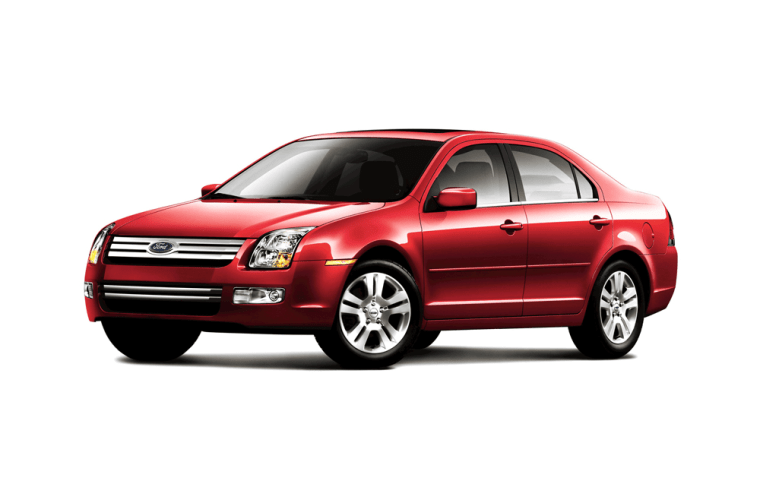It’s hard to believe it these days, but when Ford introduced the Taurus sedan in late 1985 it was a breakthrough in design for both the automaker and the automotive industry.
Some even thought its design too advanced to sell, but the Taurus went on to ship some 7 million units over the next two decades and claim the title of best-selling car in the United States between 1992 and 1996 until it was unseated by Toyota’s Camry in 1997.
Ford desperately needs another blockbuster like the Taurus — its last great triumph in the midprice, midsize passenger car market. Since the demise of the Taurus, the Camry and Honda Accord have locked up the top spots in the segment. And although Ford has decided to revive the Taurus name by rebranding the Five Hundred sedan, the nation's No. 2 carmaker is currently hurting in the category.
Ford sold just 12,435 Fusions in June, while the new Taurus sold 5,836 units in its second month on the market and its predecessor, the Five Hundred, sold 3,029. Sales of all three paled in comparison to General Motors' Chevy Impala, which clocked 35,849 unit sales in June, and Toyota’s market-leading Camry, which sold 46,630 units.
“It’s clear that the dogs don’t like the dog food,” said John Wolkonowicz, senior auto analyst for North America at consultancy Global Insight. “The Ford Fusion isn’t a failure in anyone’s book, but it’s not the savior of the Ford Motor Company either. Sales numbers for the Camry and the Impala show the kinds of numbers that can be generated in this segment, but Ford’s Fusion just isn’t doing it.”
The Fusion’s sales numbers come despite critical acclaim for its latest sedans, including the Fusion; its corporate cousin, the Mercury Milan; and the more upscale Lincoln MKZ. The Fusion was nominated for the prestigious North American Car of the Year award at last year's Detroit auto show.
Also, despite shrinking sales of the Fusion, other Ford brands saw decent sales numbers in June — the new Ford Edge crossover, for example, posted record sales of 12,470 for the month, while the redesigned Ford Escape’s sales rose to 19,147 in June, up 32.6 percent from the year-earlier period.
Still, despite its awards and praise, the Fusion, like the new Taurus and the Five Hundred before it, is a “miscast” vehicle, says Wolkonowicz.
Broadly speaking, there are two types of car buyers, he argues — one with a “blue collar” mindset and another with a “white collar” mindset.
The distinction doesn’t necessarily separate by profession: A lawyer could have a “blue collar” mentality, while a manual laborer could have “white collar” tastes. But the blue-collar consumer tends to be loyal to the Big Three U.S. automakers — GM, Ford and Chrysler — while those with “white collar” tastes buy more foreign-made cars like BMWs, Toyotas and Hondas.
With the Fusion, Ford is too closely copying a Camry, hoping to emulate its success, when Ford’s customers have a predominantly blue-collar outlook and want something that looks distinctly “American,” said Wolkonowicz.
“That means a Camaro as opposed to a Hyundai Tiburon, or a Chrysler 300 instead of a Camry — these are the sorts of products they need to create,” he said. “Ford customers don’t want to be seen in a Camry clone,” he added. “They’re looking for something with more flair.”
A case in point is the Ford Mustang, said Wolkonowicz. It’s a quintessentially American car that saw its sales tumble 15.7 percent in June from the same period a year ago but still managed to sell 12,781 units during the month, considered decent for an older model catering to a niche market.
“That car is consistent with the Ford image,” he said. “That’s the sort of car Ford needs to produce. They need to make products that the consumer is excited about; vehicles that the consumer gets excited about, like the Mustang and the F-Series pickup trucks — they are the products that people think about when they think about Ford.”
Jack Nerad, market analyst at Kelley Blue Book, is more upbeat on Ford’s midsize sedan range.
“The Fusion is exactly the sort of vehicle that Ford should be coming out with — it’s high value and has a distinctive style,” he said. “The price is in the right range for the average working person, and that’s exactly the demographic Ford should be aiming at because that’s where it has enjoyed the most success, from the original Taurus back to the Model T.”
Nerad says the Fusion is one of Ford’s most positive vehicles in years, although he acknowledges that the midsize sedan market is cluttered and filled with tough competitors like the Camry, Accord and Nissan Altima.
“What we have seen is the continuation of a trend that started 20 or 30 years ago,” Nerad said. “The domestics lost momentum with baby boomers in the midsize segment over a length of time. It’s not something that changed overnight, so it’s going to take some time to re-educate those consumers about the virtues of American cars.”
